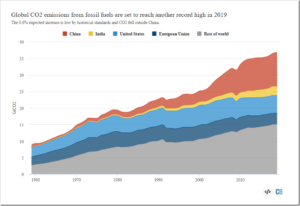by P. Homewood, February 6, 2020 in NotaLotofPeopleKnowThat
Emissions from fossil fuel and industry (FF&I) are expected to reach 36.81bn tonnes of CO2 (GtCO2) in 2019, up by only 0.24GtCO2 (0.6%) from 2018 levels, according to the latest estimates from the Global Carbon Project (GCP).
The data is being published in Earth System Science Data Discussions, Environmental Research Letters and Nature Climate Change to coincide with the UN’s COP25 climate summit in Madrid, Spain.
The growth of global emissions in 2019 was almost entirely due to China, which increased its CO2 output by 0.26GtCO2. The rest of the world actually reduced its emissions by -0.02GtCO2, thanks to falling coal use in the US and Europe, as well as much more modest increases in India and the rest of the world, compared to previous years.
The GCP researchers say that “a further rise in emissions in 2020 is likely” as global consumption of natural gas is “surging”, oil use continues to increase and, overall, energy demand rises.
Despite the rapid rise and falling costs of renewables in many parts of the world, the majority of increases in energy demand continue to be met by fossil fuels. For example, gas met around two-fifths of the increase in demand in 2018, against just a quarter coming from renewables.
Overall, human-caused CO2 emissions, including those from FF&I and land use, are projected to increase by 1.3% in 2019. This is driven by a 0.29GtCO2 (5%) increase in land-use emissions – including deforestation – which is the fastest rate in five years. While land use only represents around 14% of total 2019 emissions, it will contribute more than half the increase in emissions in 2019.
While more modest than in recent years, the increase in emissions in 2019 puts the world even further away from meeting its climate change goals under the Paris Agreement.

…
